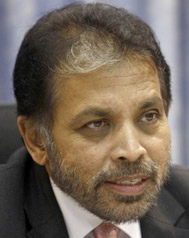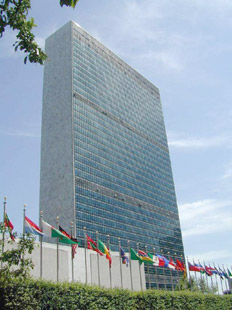|
Government's goodwill not reciprocated:
LTTE fronts ban comes after years of tolerance - Dr. Kohona
By Manjula Fernando
Sri Lanka's Permanent Representative to the United Nations Dr.
Palitha Kohona said the proscription of 16 organisations under the UN
resolution 1373 which called for international cooperation for
suppressing terrorism financing, was what required now after years of
patient tolerance of the actions of these fronts.
 |
|
Sri Lanka's Permanent
Representative to the United Nations, Dr. Palitha Kohona |
He however opined that the Sri Lankan ban, to be fully effective, it
must be mirrored in the countries where these organisations operate
freely.
Q. Sri Lankan Government, early this week, took action to
proscribe 16 organizations which it identified as fronts of the LTTE
involved in terrorism financing overseas, under the UN resolution 1373
which came into being after the US's 9/11 attack. Why is the resolution
1373 important?
A. Security Council Resolution 1373, adopted under Chapter VII
of the United Nations Charter required UN Member States to adopt a range
of measures to criminalise terrorist fund raising, fund transfers and
money laundering, providing support for any terrorist enterprise and
take appropriate follow-up legal action. Charter VII resolutions impose
mandatory obligations on UN Member States.
This action by the Security Council was, in large measure, a response
to the 9/11 attacks on the US. Although terrorism had plagued many
countries of the world for decades, including Sri Lanka, it was only
after 9/11 that the US really began to marshal its resources and world
opinion to counter the global threat posed by terrorism.
Since then countries have, consistent with Security Council
Resolution 1373, increasingly used their domestic legal regimes and
military/intelligence capabilities to undertake counter terrorism
measures.
Q. What would be the long term and short term impacts of this
action?
A. It certainly would place a constraint on individuals and entities
from associating with and seeking assistance from, including funding,
from the entities listed. Hopefully this would discourage Sri Lankans,
from continuing their contacts with them. There has been a tendency in
recent times to openly court the listed entities, especially in Western
countries, where they operate openly. It is also possible that the ban
would drive these contacts underground and encourage clandestine
contacts.
Q. There were media reports from Geneva that some of these
fronts such as the Global Tamil Forum, BTF and TETG were actively
campaigning against Sri Lanka in support of the recent resolution led by
the US as well as on previous occasions. Don't you think banning them
now is similar to closing the stable door after the horse has bolted?
A. The Sri Lankan ban must be mirrored in the countries where
these organisations operate, to be fully effective. We hope that this
will be the case.
Q. TNA leader R.Sampanthan publicly criticized this move
saying that the Government was making a serious mistake. Your comment?
 |
|
UN Headquarters in New York |
A. The Government had acted with great restraint and
compassion towards those who resorted to terrorist violence and their
supporters since the defeat of the LTTE in 2009. Close to 12,000 former
combatants have. been released after a short rehabilitation programme.
Unfortunately, the goodwill demonstrated by the Government and the
people of Sri Lanka was not reciprocated leaving little choice to the
Government which had to respond to the demands of the majority of the
people. It is no secret that the entities listed in the Gazette
notification have been campaigning to realise the separatist goal of the
LTTE by using international pressure to supplement their other
activities. Reconciliation is a two way street.
If one side exploits the forbearance and the goodwill of the other to
advance its own agenda under a different pretext and through barely
camouflaged means, one can not expect the kid glove approach to
continue. Many expected the resolution to result in hard line positions
to be consolidated where compromise had seemed possible earlier.
Unfortunately, this has become a reality now.
Q. LTTE and their sympathizers seem to have launched a
propaganda war over the listing of these fronts. A news report posted on
a website said, the Government was targeting the wife of ex-tiger
leader, Sasitharan following the proscription. Is it a new threat that
is emerging?
A. Sri Lanka will have to organise itself to counter this
threat on a wide front - domestically by marshalling all anti separatist
elements of our country as we so successfully did in the final campaign
against the terrorist LTTE and internationally by ensuring that the
separatist agenda of these listed elements is exposed. It is important
to constantly highlight the past terrorist links of the leaders and
sympathisers of these listed entities. Many of those espousing human
rights causes today were engaged in raising funds for a proscribed
terrorist organisation deploying suicide bombers and recruiting child
combatants by the thousands, not too long ago.
Q. Some of these fronts have very close links with Western
governments as well as members of some Tamil political parties in Sri
Lanka including the TNA. Can the government prosecute and jail any
member for continuing links with these banned fronts?
A. That appears to be the objective of the listing.
Q. The ban is effective only in Sri Lanka. How can the
government stop terrorism financing and fund raising taking place
overseas?
A. We need to seek complementary actions in other countries.
It is to be remembered that many countries have already criminalised the
activities reflected in SC resolution 1373 and SC Resolution 1267. Legal
action has been taken against a range of LTTE sympathisers in countries
such as the US, France, Australia, Canada, Italy and Germany.
We should intensify our links with the law enforcement authorities of
these countries and exchange information so that they could continue to
undertake legal action where terrorist related activity is suspected.
Q. Some argue imposing a blanket ban on all these
organizations at once would be counter productive to what the Government
hope to achieve. Your comments?
A - It is important to expose the true goals of these
entities. The ban, after years of patient tolerance, may be what is
required now.
Q. The 32 countries which have banned the LTTE as a terrorist
group will follow Sri Lanka's example?
A. They will need to be convinced that such a ban is
consistent with their international obligations, for example under SC
Resolution 1373, and their own principals and needs. |

